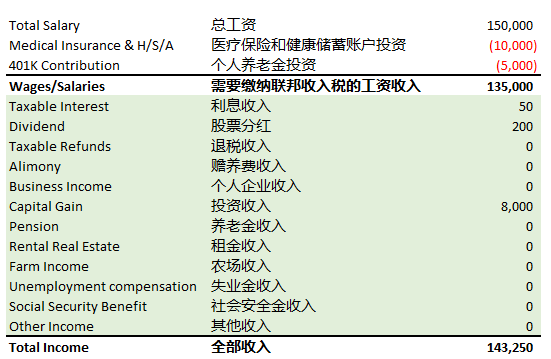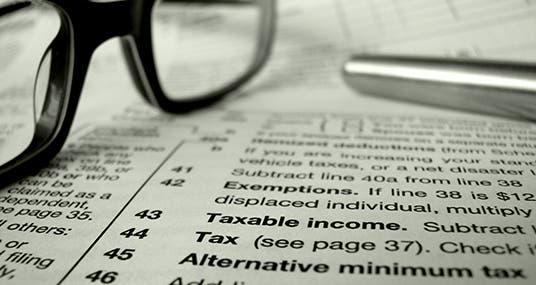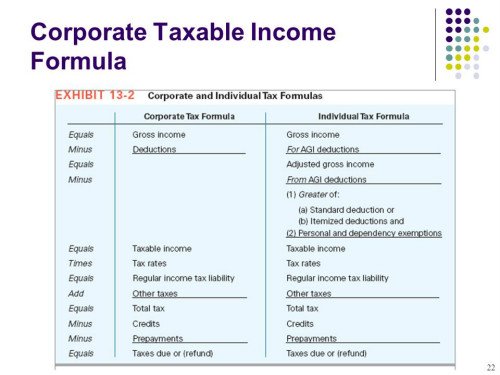下面哪个州,有state income tax on wages · Issue #28 · eagleoflqj/p1a3_script · GitHub

下面出国留学网小编为大家推荐的英语听力材料是怀特艾森豪威尔与记者的精彩问答---一个留下很多未解谜团的总统:PWe Have Cut Expenditures 我们已经降低了支出,没有发现秘密协议。 详细内容如下: 点击收听音频 Reporter: Merriman Smith, United Press: Mr. President, we have heard something of this from other sources, but we wonder if you could tell us about the reasons and your plans to ask Congress to postpone the corporation and excise tax reduction next year? 记者:我是合众社的梅里曼? 史密斯,总统先生,我们从其他渠道听到了一些事情,但是我们想知道你是否能告诉我们你要国会推迟明年减少税收实践的计划和原因? Eisenhower: Well, it is a very simple process. As I have told you before, the financial affairs of the Government are really very complicated, and they have numbers of unknown factors. One of them is the expenditures, what they are going to be, which always have to be estimated in advance. Another is income. And the other, of course, is the deficit and its effect on the value of the dollar, which introduces, definitely a variable factor. This administration has been very much in favor, as you know, of extending such things as social security coverage, unemployment coverage, and all that sort of thing. There are two reasons for that一there are three reasons: one, of course, is the humanitarian, giving to these people a feeling of security and confidence. Two, the added stability you get in times of recession; you keep up the income of the mass of people, and keep up their purchasing power. But, three, all of this falls by the board unless your money stays stable. A pension plan is worth nothing if you pay for it in dollars that are now worth a hundred cents, and finally you draw it down in terms of 2-cent dollars. So, this whole business of the financial affairs of the country, you have to take all of these things into account simultaneously. Now, to lower taxes, you first must lower expenditures; and we have cut expenditures as, I think you will see when the figures finally come out, to what we consider the safe minimum. But if you still have a deficit that begins to loom up as having a real effect on the value of your dollar, then you must keep up your taxable income. That taxable income, as we see it now forecast, will require the continuation of the 5 percent extra on the corporations, and these excise taxes as they now stand. Of course, they were already reduced last year. That takes positive action on the part of the Congress, because they are due to expire—those two taxes—as you know, on April 1st I believe it is. So it is merely a question of keeping all of these matters in balance, as we see it, to the good of the whole country. 艾森豪威尔:嗯,这个很简单。 我之前告诉过你们,政府的金融事务真的很复杂,这里有很多未知因素。 其中一个是费用支出,他们要做的事情总是要提前进行估算的。 另一个是收入,当然还有赤字和赤字对美元价值的影响,这就是可变因素。 政府大力支持,如你所知,政府支持增加社会保险覆盖率和失业保险覆盖率等这样的事情。 有两个原 因——是三个原因:第一,当然是出于人道主义的考虑,给这些人保障和自信。 第二,这增加了衰退期人们生活的稳定性,保证了人民大众的收入,保证了他们的购买力。 但是,第三,只有货帀稳定了,经济才不会衰落。 如果以现在价值美分的美元支付,那么津贴 计划就没有用处,最终人们只能拿到2 美分。 所以,国家的整个金融事业必须自发地把所有的事情都算在内。 现在要降低税收,首先要降低支出;我们已经降低了支出,我想当最终数据出炉后,你们会看到我们计划的最小安全数字。 但是如果还有赤字,且赤字开始对美元 价格产生真正影响,那么你就必须维持 税收收入。 当然,去年已经 降低了税收。 国会方面采取了积极行动,因为马上就要到期了——你知道,我想那两项税收是4月1日到期。 所以这仅仅是保持这些问题平衡的问题,如我们看到的,是为整个国家好。 Reporter: Raymond P. Brandt, St. Louis Post-Dispatch: Mr. 记者:我是《圣路易斯邮报》的雷蒙德? 布兰特,总统先生,你会延迟一年或两三年再收税吗? I had thought of it in terms of 1 year, but it may be that the Treasury Department has some other term in mind. 艾森豪威尔:我想还没有就这个问题进行具体讨论。 我第一年任期已经考虑了这个问题,但是可能财政部在顾虑其他方面。 我不能给你准确的答案,因为还没讨论到这一点。 Reporter: John Herling, Editors Syndicate. President, in the past year the Secretary of Labor has come up with at least two major ideas: one, the raising of the minimum wage from the present 75-cent level, and, two, the opposition to the anti-union shop laws in States now permitted under the Taft-Hartley law. Does the Secretary of Labor. 记者:我是《辛迪加编辑》的约翰? 劳动部部长有没有—— Eisenhower: You are talking about the right-to-work laws of the States? 艾森豪威尔:你是说美国的自由工作权法? Does the Secretary of Labor then have your support on the increase in the minimum wage and, second, do you yourself favor the position of the Secretary of Labor in regard to the so-called right-to. -work laws? 记者:嗯,支持者称之为自由工作权法,反对者不这么叫;是的,先生。 劳动部部长在增加最低报偿的事情上得到了你的支持吗? 第二,你个人支持他在所谓的自由工作权法上的态度吗? Eisenhower: With regard to the first, the whole question of increase in minimum wages was discussed, as I recall, in the last Economic Report that I submitted to the Congress. This administration does stand in favor of the adjustments, I believe I said then, at the proper time; and the proper time is certainly an expanding period in the economy. This matter has been under discussion; not ready to make a final announcement, but it is a matter that is under intensive study at the moment. Now, on this point of the right-to-work laws: I have heard it discussed ever since I have been in my present office, pro and con. Of course, labor unions are very much against it. So you have here, to my of hoists you on the horns of a mind, a matter that sort dilemma if you believe, as I do, very firmly in constitutional government. I am not particularly certain in my own mind just where the right does lay here. Of course, the Supreme Court has held under the Interstate Commerce provisions that the Federal Government has a right to operate in all these areas and should assume responsibility. But also there is the provision in the Constitution of the reservation of certain rights to the States. It is one that has been argued in front of me. But, in the meantime, I have upheld the right of Secretary Mitchell to express his own convictions, because he has always held them, and so notified me, even before I appointed him. 艾森豪威尔:关于第一个问题,增加最低报偿的问题已经讨论了,我想想,这是在我递交国会的最近的一次经济报告中讨论的。 政府在适当的时期支持进行这些调整,我想我当时说了;合适的时期当然就是经济扩张的时期。 已经讨论了这件事;但是还没有做最后的声明,此时我们正在紧急研究这件事。 关于自由工作权法这一点,我听说自从我上任就开始讨论到底支持不支持了。 当然,工会是很反对的。 但是很多州还没有这个,他们是很支持的,因为他们说这代表了各州在某些领域有不可剥夺的宪法权。 所以,我想,这件事对目前的窘境起了推波助澜的作用,如果你和我一样坚定相信立法机构的话。 我自己不太确定所提出的权利。 但是也有条款认定州政府有某些宪法保留。 我不能说自己作了不可挽回的决定。 他们曾在我 面前争论过这个问题。 直到最近国会严肃地提出了塔夫脱-哈特利法案,这件 事才被彻底捅了出来,我只是不知道我会作什么决定。 但同时,我支持部长米歇尔表达自己看法的权利,因为他一直坚持他的看法,甚至在我任命他之前他就知会了我。 Reporter: Sir, may I ask whether—the Secretary of Labor is your chief labor adviser,is he not? 记者:先生,我想问一下劳动部部长是你的首席劳动顾问吗? Eisenhower: That is right; indeed, he is. 艾森豪威尔:没错,他确实是。 Reporter: May I ask would it be 记者:那我能问一下会—— Eisenhower: But listen, I will make this no adviser who can take over from me the for making a decision for my own action the responsible one, no matter if I have advisers who are chief or even sole. I have finally to take the responsibility for my own actions. 艾森豪威尔:但听着,我得说清楚,没有一个顾问曾代替我决定我的最终行动。 这是我的责任,不管我将来有没有 首席顾问或是只有一个顾问。 只有我有责任作出最终决定。 Reporter: James Reston, New York Times: As I understand it, sir,the North Atlantic Council in Paris this week is going to discuss the question of the atomic defense of Western Europe. Would you give us the benefit of your thinking as to who has the power of decision in the event of an attack, the power of decision of using atomic weapons in Western Europe? 记者:我是《纽约时报》的詹姆斯赖斯顿,据我所知,先生,巴黎的北大西洋组织这周将讨论西欧的原子能防御问题。 你能不能给我们讲讲你对袭击事件中谁有决定权这个问题有什么看法,谁有权决定在西欧使用核武器? Eisenhower: As a matter of fact,you raised the very question that is under discussion this week; and I think it would be most unwise for me to give my own convictions publicly when my own representatives are engaged in the negotiations on this point. In certain areas and in certain fields, of course, our own right to act as we see fit is unquestioned. When you have allies,if you are going to treat them as partners, you have to take into consideration their beliefs, their convictions. If they differ from yours, there is often very good reasons for it; and, therefore, you have to negotiate it out and see where you come out. I will probably be ready to say a little bit more about this after this meeting is over; but, as it is now, I think that is about all I should say. 艾森豪威尔:事实上你提出了这周的讨论问题,我想要是我公开发表自己的意见是很不明智的,因为我的代表此时还在进行谈判。 在某些领域,当然,我们自己适当行动的权利是毋庸质疑的。 有同盟国时,如果要把他们看做同伴,就要把他们的看法和信仰列入考虑范围。 如果我们利益相互,那往往也是有原因的,因此就必须进行商榷,看看会有什么结果。 我很可能在会议结束后多说一点看法,但是现在,我想只能说这么多了。 Reporter: Daniel Schorr, CBS News: Mr. President, it has been reported that the administration is planning a further cut of a hundred thousand— 记者:总统先生我是有线电台的丹尼尔肖尔,总统先生,据报道政府计划进一步减少10万—— Eisenhower: To do what? 艾森豪威尔:干什么? Reporter: 一a further cut of 100,000 in Army strength in the next fiscal year, and the withdrawal of the 1st Marine Division from the Far East. If that is so, could you explain the thinking behind it? 记者:明年在军事力量方面减少10万财政支出,从远东撤出第一海军分队。 如果是这样,你能不能解释一下这背后的原因? Eisenhower: Where was this reported? 艾森豪威尔:哪里看到的报道? Reporter: On CBS, sir. Laughter 记者:有线电台,先生。 笑声 Eisenhower: Well, I guess I must accept that as authoritative. Laughter The only reason I am a little hesitant about giving you my thinking on this matter is that a full exposition would require probably more time than we should like to give to it. I can say this, and it is in an attempt to, you might say, almost epitomize my thinking: the United States,as a nation, never had any reason to be particularly fearful of direct attack upon itself until the advent of two things-one, the long-range bomber or a means of delivering weapons upon us; and, secondly, of very destructive weapons. This, then, points 一as I say, I am really cutting comers一this fact points to this one great need on our part: ways of blunting any attack against us,and ways of trying to deter it, preventing it from ever occurring. Here is where comes in the philosophy, you know, of retaliation, to make certain that no one can ever attack us and hope to gain by that kind of attack. 艾森豪威尔:嗯,我想我必须把这个当作权威了。 笑声 我在是否就这件事上发表看法上有些犹豫的唯一的原因是全面的战争爆发可能比我们原计划的时间要长。 我这么说,你可能会试图概括说这是我的想法:美国,作为一个从来没有任何理由害怕别国直接袭击自己的国家,除非有两件事出现----,远程导弹或者是输送武器的方式的出现;第 二,就是大规模杀伤武器的出现。 简单地说,这个事实指出了我们最大的需求:阻拦对我们的袭击方式,延迟袭击 的方式以及防止袭击出现的办法。 这就是这一思想引发的问题,即反击,从而确保没有人能袭击我们,或希望从那种 袭击中得到些什么。 推荐阅读:.
次の
美国哪个州征收的个人所得税最高?_征税

Everybody wants a lower tax bill. One way to accomplish that might be to live in a state with no income tax. As of 2020, seven states—Alaska, Florida, Nevada, South Dakota, Texas, Washington, and Wyoming—levy no personal income tax. They do currently tax investment income and interest, but both are set to eliminate those taxes soon. That will bring the number of states with no income tax to nine by 2025. States with no income tax often make up the lost revenue with other taxes or reduced services. A state's overall tax burden, which measures the percent of income paid in state and local taxes, could be a more accurate measure of its affordability than its income tax rate alone. Other factors—including healthcare, cost of living, and job opportunities—are also important in determining how expensive a state is. to one of these enlightened lands, however, you might want to consider other factors, including: Florida This popular snowbird state features warm temperatures and a large population of seniors. Sales and property taxes in Florida are above the national average, but the overall tax burden is just 6. Florida ranks 35th in affordability, 10 places higher than Alaska, but it still not as affordable as most states due to higher-than-average cost of living and housing costs. On the other hand, Florida comes in at 13 on the U. Nevada Nevada relies heavily on revenue from high sales taxes on everything from groceries to clothes, on alcohol and gambling, and taxes on casinos and hotels. This results in an overall state-imposed tax burden of 8. South Dakota Like many no-tax states, South Dakota counts on revenue from taxes on cigarettes and alcohol. The home of Mount Rushmore has higher-than-average property taxes but lower sales-tax rates than many other states. It also features a tax-friendly climate for retirees. Washington Washington hosts a young population and many major employers, thanks to no state-mandated corporate income tax. Residents do pay high sales and excise taxes, and gasoline is more expensive in Washington than in most other states. The state comes in at 19 out of 50, with an overall tax burden of 8. Wyoming With an estimated six people per square mile, Wyoming is the second least densely populated state, bested only by Alaska, which has roughly one human for every square mile. Citizens pay no personal or corporate state income taxes, no retirement income taxes, and enjoy low property and sales tax rates. The overall tax burden—including property, income, sales, and excise taxes as a percentage of personal income—is 7. Tennessee Before 2016, Tennessee taxed income from investments, including most interest and dividends, but not wages. 29 per gallon. The gasoline tax is high too. With full implementation of the new legislation, Tennessee expects to attract retirees who depend heavily on investment income. In the affordability category, Tennessee ranks 22nd overall, and on the U. New Hampshire New Hampshire does not tax earned income but does tax dividends and interest. The state has no state sales tax but does levy excise taxes, including taxes on alcohol, and its average property tax rate of 2. Nevertheless, the state ranks second on the U. These include white papers, government data, original reporting, and interviews with industry experts. We also reference original research from other reputable publishers where appropriate. You can learn more about the standards we follow in producing accurate, unbiased content in our• USA. gov. " Accessed Feb. 28, 2020. Tennessee Department of Revenue. "" Accessed Feb. 28, 2020. General Court of New Hampshire. " Accessed Feb. 28, 2020. New Hampshire Department of Revenue Administration. " Accessed Feb. 28, 2020. WalletHub. " Accessed Feb. 28, 2020. Alaska Department of Revenue Permanent Fund Dividend Division. "" Accessed Feb. 28, 2020. Alaska Legislature. "," Page 20. Accessed Feb. 28, 2020. Nevada Resort Association. " Accessed Feb. 28, 2020. South Dakota Department of Revenue. " Accessed Feb. 28, 2020. USAToday. " Accessed Feb. 28, 2020. South Dakota Department of Revenue. " Accessed Feb. 28, 2020. South Dakota Department of Revenue. " Accessed Feb. 28, 2020. LawInfo. " Accessed Feb. 28, 2020. Texas Constitution. " Accessed Feb. 28, 2020. Texas Comptroller. " Accessed Feb. 28, 2020. United States Census Bureau. " Accessed Feb. 28, 2020. Washington State Department of Revenue. " Accessed Feb. 28, 2020. United States Census Bureau. " Accessed Feb. 28, 2020. Wyoming Department of Revenue. " Accessed Feb. 28, 2020. Federation of Tax Administrators. " Accessed Feb. 28, 2020. Tennessee Department of Transportation. " Accessed Feb. 28, 2020. New Hampshire Department of Revenue. " Accessed Feb. 28, 2020. New Hampshire Business Review. " Accessed Feb. 28, 2020.
次の


